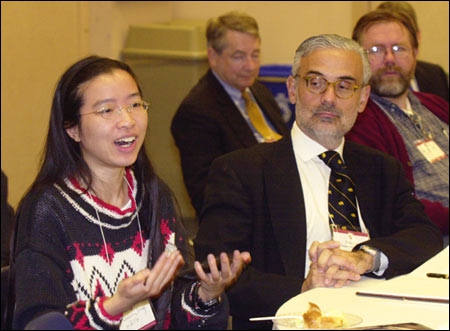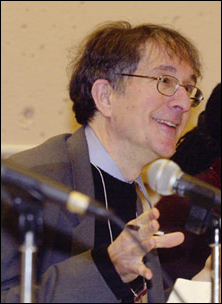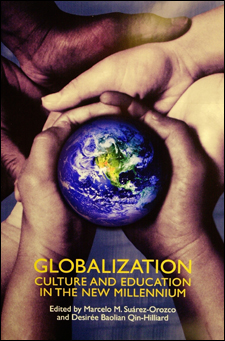Globalization and education explored at GSE
Academics, journalists pose question, ‘How do we educate for a global economy?’

A diverse range of expertise presented by panelists and participants from around the world sparked thought-provoking discussion and dissent at “Globalization and Education,” a conference at the Graduate School of Education (GSE) Thursday (Feb. 26). The conference, sponsored by the GSE, the Nieman Foundation for Journalism, and Ross Institute Agenda, drew from findings presented in the forthcoming book of essays, “Globalization: Culture and Education in the New Millennium” (University of California Press in association with the Ross Institute, April 2004). With commentary by faculty experts in education, history, economics, and social studies, and by international journalists from the Nieman Foundation and elsewhere, the conference shed light on the promise and perils of globalization and education’s fitness to meet it.
“Globalization is like the air that we breathe. In a fundamental way, it’s everywhere. Not all of it is good, but try being without it,” said GSE professor Marcelo Suárez-Orozco, co-editor of the book and chair of Harvard’s Interfaculty Committee on Immigration and Well-Being. “No topic today, whether it’s the outsourcing of jobs, whether it’s the war on terrorism, whether it’s the environmental processes, can be contained within the separate domains of individual nation-states,” added Suárez-Orozco, the Thomas Professor of Education.
Globalization’s long history
Despite its current buzz, globalization is hardly a new phenomenon, said John Coatsworth, the Gutman Professor of Latin American Affairs at Harvard. Taking a centuries-long view, he showed that the globalization of the past few decades is minor and nascent compared with three other major phases that have shrunk the

world throughout history: the European cross-oceanic exploration of 1492 to roughly 1565, the forced migration of Africans to slave plantations in the New World a century later, and the massive migratory flows from Europe and Asia to the Americas during the “Belle Epoch” of the late-1800s to the Great Depression of the 1930s.
While each of these earlier cycles of globalization saw rapid growth in the world economy, they exacted a heavy human toll, he said, noting the near-devastation of Native American populations, the horrors of slavery, and the misery of immigrants in the early 20th century. “It is not always the case that increases in productivity correspond to and translate into increases in human welfare instantly,” he said. Further, these cycles widened the gap between the rich, whose wealth was accelerated by globalization, and the poor, who were more likely to suffer its effects.
Education is one of the few forces with the potential to mitigate the negative affects of globalization and the inequality it threatens, said Coatsworth. As this latest wave of globalization brings immigrants who maintain closer ties to their native countries and consider themselves binational in a way that was deemed treasonous a century ago, however, education must embrace the diversity of culture in our society.
“Teachers and schools need to have the flexibility to cope with and make use of the cultural resources that are in their classrooms,” he said, adding that standardized testing could undermine educators’ ability to tap these cultural riches.
‘Illiteracy anywhere creates risk everywhere’
Economics offers the same message as history, said economist and demographer David Bloom. “Education gives a capacity to adapt to change,” said Bloom, the Gamble Professor of Economics and Demography at Harvard. “Education creates a

capacity to mitigate the disparities in the world today that are potentially very destabilizing, both from an economic and a political point of view.”
Bloom said that the world economies that have thrived in globalization – East Asian countries and the “Celtic Tiger” of Ireland, for instance – share a deep commitment to education. But while these nations have harnessed globalization to increase their prosperity, globalization has more widely distributed wealth to the wealthy and few benefits to the poor, creating troubling and destabilizing worldwide disparities.
“What the world seems to be learning is that illiteracy anywhere creates economic and political risk everywhere,” said Bloom.
With the fingers of globalization pointing expectantly toward education, Howard Gardner, GSE Hobbs Professor of Cognition and Education, took the microphone, giving an educator’s perspective on the effects of globalization. He proposed a number of changes – some of them surprising – to American precollege education that he said could help young people better comprehend and engage with their changing world.
Education should help students synthesize information from a variety of disciplines and geographies, so they understand how economics informs politics, for instance, or that the economy of India can affect their job prospects, said Gardner.
On the other hand, he recommended that educators back off on a few educational practices to make room for this interrelated style of education. The tools of new media, for example, have made a fact-based emphasis redundant. “I have my Palm Pilot here, and a lot of the stuff I learned in grade school is in there,” he said, adding that educators should teach children how to find information, not have them memorize facts. Like Coatsworth and Bloom, Gardner disparaged standardized testing; in its current form, it fails to measure the skills of understanding and making sense that students will need in a globalizing world, he said.
Real-world perspectives
Journalists Adrian Wooldridge of the Economist and Nieman Fellow Lizeka Mda of the Sunday Times of South Africa challenged the panelists and engaged the audience with outspoken views and real-world examples of globalization and education.
The Oxford-educated Wooldridge presented standardized testing and its business-like focus on accountability more favorably. Asian countries, he said, have been winners in globalization in part due to their fact-based emphasis on education. The inner-city schools in Los Angeles, where he once lived, on the other hand, are turning out globalization’s losers.
“What we need to fix is the bottom half of the education system,” said Wooldridge, and the Asians can be an example for that, he added.
Journalist Yilu Zhao, a Shanghai native who spoke during a later panel, asked Wooldridge why, if Asian schools were such a model, was the computer chip not invented in China. The United States, not China, is a leader in scientific innovation.
“One answer to why computer chips were invented in America is that all the smart Chinese kids are coming to America,” countered GSE assistant professor Vanessa Fong.
This brain drain has had a widespread impact in Africa, said Mda, where education is valued and highly subsidized but where educated citizens rarely remain. Ghanaian college graduates drive taxis in London and locally trained doctors practice in the United States, Canada, or elsewhere, she said.
Mda gave the perspective of a region still waiting for globalization to deliver on its promise. “It’s not working for us. I’m looking for answers,” she said.
Just wait, Coatsworth responded; if Latin America’s experience with the global economy is any example, Africa may get its due in several years. Bloom offered an economist’s perspective: Africa’s lack of international trade is its underlying economic problem, he said, and it’s one that could be fixed by good policy. And policy, he said, returning to a familiar drumbeat, is informed by education. “You get good leaders with good education,” he said.




